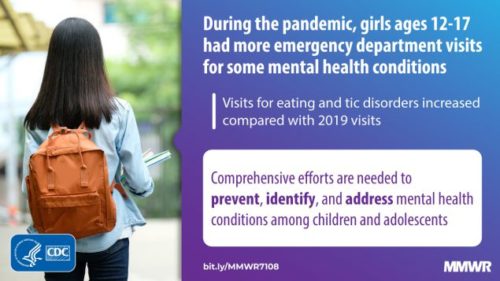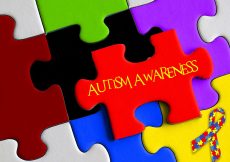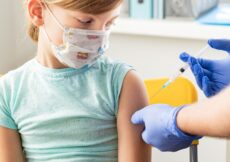March 3rd, 2022
Last Friday, we flashback-ed to observe National Eating Disorders Awareness Week, which is “an annual campaign to educate the public about the realities of eating disorders and to provide hope, support, and visibility to individuals and families affected by eating disorders.”
As this year’s observance was beginning, the Centers for Disease Control and Prevention dropped a new study in Morbidity and Mortality Weekly Report showing a spike of pediatric emergency department visits for mental health conditions (MHCs) coinciding with the pandemic. The incidence of eating disorders was high, especially in teenage girls:
Weekly ED visits among adolescent females (aged 12–17 years) increased for two MHCs (eating and tic disorders) during 2020, four (depression, eating, tic, and obsessive-compulsive disorders) during 2021, and five (anxiety; trauma and stressor-related; eating; tic; and obsessive-compulsive disorders) and overall MHC visits during January 2022, compared with 2019. The proportion of ED visits with eating disorders doubled among adolescent females; those for tic disorders approximately tripled during the pandemic.
We learned last week just how much kids’ psychological health is being affected by the pandemic, with an urgent need for mental health services to diagnose and treat children for a variety of mental health conditions, such as stress-related adjustment disorders, anxiety, and depression. Another study from the same group of CDC researchers indicates growing despair among youths in America, reports Brian P. Dunleavy:
Similarly, trips to the ER due to injuries caused by “self-harm” among people ages 12 to 17 years rose by 50% or more over 2019 figures in each of the three years impacted by the pandemic, 2020, 2021 and 2022, the data showed.
Visits related to symptoms of mental health disorders in this age group increased by up to 60% over the same period, while those related to drug poisonings, or overdoses, spiked by up to 70%, the agency said
Between March 2020 and January 2022, emergency department visits for firearm injuries increased by a factor of 4 and cannabis-related visits tripled in 12-17-year-olds. Matt Richter explains how eating disorders joined the list of MHCs “affecting a generation of adolescents”:
Mental health experts hypothesize that the pandemic prompted some youth to feel isolated, lonely and out-of-control. Some coped by seeking to have control over their own behavior, said Emily Pluhar, a pediatric psychologist at Boston Children’s Hospital and instructor at Harvard Medical School.“
You take a very vulnerable group and put on a global pandemic,” she said. “The eating disorders are out of control.
In the C.D.C. study, the agency said that the proportion of eating disorder visits doubled among teenage girls, set off by pandemic-related risk factors, like the “lack of structure in daily routine, emotional distress and changes in food availability.”
The CDC recognizes the urgency of responding to the national emergency in children’s mental health at a time when resources are strained:
Early identification and expanded evidence-based prevention and intervention strategies are critical to improving pediatric mental health, especially among adolescent females, who might have increased need.
Parents who are concerned about their child’s mood, worries, or eating behavior are urged to contact their pediatrician as soon as possible. Children, teenagers, and adults experiencing a mental health crisis in the Pittsburgh area can also call resolve Crisis Services 24/7 for immediate help at 1-888-796-8226.




































